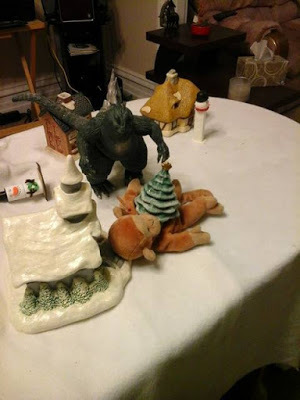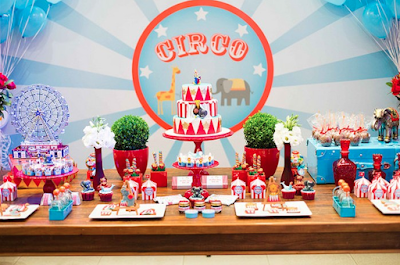Deck the Halls with Boughs of Pity

While rumbling around the Internet, I clicked onto a piece which first appeared Dec. 20, 2016 on Redbook’s site. In it, the author reveals a philosophy that is mind-boggling in its self-absorption.
In the piece, titled “Please Stop Posting Your Christmas Dinner Photos,” Perri O. Blumberg, a former editor at Reader’s Digest and a full time writer, opines that the photos posted on social media of people enjoying the holidays with their families are making her…well sad. No, seriously.
She writes, "For people with families like mine {it was just her and her dad}, the excessive stream of family dinner photos that inundates my feeds during the holiday season just feels exhausting and insensitive.”
Yes, the act of someone posting a photo of an event in which they felt great joy seems "exhausting and insensitive" to this young woman who apparently is unfamiliar with the notion of taking joy in other people's joy.
How does that work exactly?

Is the wife of Chris Hemsworth insensitive for posting photos of her life with him because there are women around the world who would love to be in her shoes? Any grandparent putting up posts about their grandchildren are being terribly hurtful to those people who would love to have grandchildren but don't. Have you taken a trip to Europe? Well the photos you've been posting of your travels are only upsetting those who haven't had a chance to get there.
To a degree I understand where Blumberg as an only child is coming from. Society stresses spending time with family during the holidays and if your family is small or if you're now on your own, you might yearn for the familial warmth that ads would have us believe go hand in hand with holidays. But don't let ads deceive you.

For example, Blumberg might consider me fortunate since I came from your typical nuclear family. Two parents and four kids. Unfortunately, this typical nuclear family was a mess and the holidays only heightened the adventure. With two alcoholics in a miserable marriage steering the borderline car crash that was the Enright family, the kids woke up, or came home from school, or came home from the houses of friends at night never knowing what to expect. Would mom be drunk and looking for a fight? Would dad be drunk and sleeping it off in bed? Would both of them be drunk and planning to use you as a tool in their matrimonial war? Was this the year Mom kicked Dad out of the house? Was this the year Dad kicked Mom out of the house? Do you know how soul shattering the sound of a pull tab being opened on a can of beer can be at 10 a.m. because you know what the rest of the day will be like from then on?
For some reason Dad's drinking didn't bother me as much as Mom's, possibly because I wasn't around him as much. He was usually off in a bar somewhere or at work. My mom, normally sweet and loving, could be mean and self-pitying about her troubled marriage when she was liquored up. It was heartbreaking to see that transformation in someone you loved so much. Still, the alcoholism of both parents played a part in the darkness of the family in general and cast a pall over the magic of the holidays in particular.

One of my sharpest memories was the night my dad, drunk in bed, told me to remind him of something in the morning. I have no clue what it was decades later, but it was apparently important to him then and he didn't want me to reveal it to Mom. Of course when I walked into the living room, Mom insisted I tell her what he told me. When I didn't, she pounded around the kitchen, going on about how much of a traitor I was, before going to bed, where she eventually threw up. I helped her into my bed (the marriage had deteriorated to the point where my parents no longer slept in the same room) and I took her sheets downstairs to wash. That night, I slept on the sofa, staring at the twinkling lights of the Christmas tree not feeling overly joyful that year.

I reveal that not to take part in a pity pissing contest but to illustrate my next point. I should hate the holidays for instances like that. I don't. December is my favorite time of year possibly because I know how wonderful it can be if treated right. It wasn't the holidays or the joy of others brutalizing me emotionally, it was my family. Eventually I learned that, difficult as it might be to obtain, I could have some control over holiday circumstances. If the parents started acting up, I could leave.
But even in the thick of it, held hostage by my underage status, I don't remember being upset when seeing photos or hearing stories of pleasant family holidays. Sure, when I was younger there was some resentment that I couldn't experience those types of holidays. Then I grew up. Then I realized that in in some situations, not all, but some, life is what you make it. The holidays are no exception.
What I find especially troubling about Blumberg’s piece is its childish need to convince others to temper their holiday joy because of the author’s FOMO. (That’s textese for “fear of missing out”). Apparently that’s a thing.
 Those Facebook photos posted of Mary and her mom baking at the holidays might be snapshots of the only time Mary gets to spend with her mom throughout the year and she wants to share her joy. The spate of posts put up by Sam who loves his family so much that he just can't stop talking about how great it was to be with them--why should that negatively affect me? Presumably, since we are friends on FB, one would think I should take a level of happiness in the fact that one of my friends is so happy. Sarah tweeting about the ski trip she and her dad took...how does that plus or minus my life? (unless it's the plus of a smile put on my face at seeing them because I know how strained the relationship was between the two when she was young and I’m glad they worked it out).
Those Facebook photos posted of Mary and her mom baking at the holidays might be snapshots of the only time Mary gets to spend with her mom throughout the year and she wants to share her joy. The spate of posts put up by Sam who loves his family so much that he just can't stop talking about how great it was to be with them--why should that negatively affect me? Presumably, since we are friends on FB, one would think I should take a level of happiness in the fact that one of my friends is so happy. Sarah tweeting about the ski trip she and her dad took...how does that plus or minus my life? (unless it's the plus of a smile put on my face at seeing them because I know how strained the relationship was between the two when she was young and I’m glad they worked it out).Being the woman I am now, I would love the opportunity to square things with my father. I would love to suggest a baking night with my mom and throw the pictures all over social media. I would love to just hang out with my older brother who always intimidated me when I was younger but who I'm sure I could have a lot of fun with being the person I am now, and both of us out of the misery of childhood.
I can't. They're dead. And I never had the chance to alter the course that my family was on up to that point. That's the way it is. Of course I regret not having happier memories of holidays as a child. But how can I, in good conscience, begrudge someone else taking joy in the success I never got to have?
Blumberg, however, has a different view of things:
 "And though I'm sure nobody means to be malicious, it can feel hurtful. Think about it: If one of your close friends just called things off with her fiancé, would she be the one you gloat to over happy hour drinks over ring shopping with your partner? Probably not. That's what perusing social media feeds feels like over the holidays for someone with little or no family."
"And though I'm sure nobody means to be malicious, it can feel hurtful. Think about it: If one of your close friends just called things off with her fiancé, would she be the one you gloat to over happy hour drinks over ring shopping with your partner? Probably not. That's what perusing social media feeds feels like over the holidays for someone with little or no family."First of all, that's not what it feels like for everyone who has little or no family. As someone who has frequently been alone on the holidays, I can somehow go on Facebook and not feel tormented at the sight of the celebratory photos people post. In fact this whole idea that Blumberg is presenting, that somehow happy holiday social media posts are partly to blame for someone’s seasonal depression, would never have crossed my mind.
But returning to her fiancé analogy, I guess the first question I would have is: What is the statute of limitations on that sort of situation? If your friend called it quits with her fiancé, how long do you have to wait before you share the news that you've just gotten engaged? Three months? One year? A decade? Or will you have to pussy-foot around the issue for the duration of what doesn't seem like a very solid friendship to avoid upsetting a person who should have been able to deal with it and move on at that point?
The fiancé analogy says more about someone like Blumberg than it does about people sharing such news.
 For Blumberg, people sharing holiday experiences on social media are not doing it because they feel so happy that they can't help but share. In Blumberg’s mind, they’re gloating. They’re rubbing it into the faces of those who aren’t experiencing such happiness.
For Blumberg, people sharing holiday experiences on social media are not doing it because they feel so happy that they can't help but share. In Blumberg’s mind, they’re gloating. They’re rubbing it into the faces of those who aren’t experiencing such happiness.Blumberg goes on to write, "I'm not asking for a pity party here."
Yet the whole piece is a heaping helping of "pity-me" trying to create an issue where really there shouldn't be one. And it’s equally unfortunate that Redbook decided to give this sort of attitude a national forum.
 I can understand her occasionally feeling the misties over not having the sort of holidays she apparently thinks she should have had, though I do ask, outside of hiding out at "semi-private yoga classes on official holidays" as she states she does, what has she done to make her holidays more magical than they are? Since time with my family often felt like being held in captivity, once he was an adult, my older brother spent the holidays flittering around visiting family and friends. One year he dressed up as Santa for the children of a friend and just continued on to other houses dressed like that. He'd stop in, give some gifts, swap some stories, then move on to the next visit. Plenty of experiences could be had and photos perfect for holiday posts could be taken during such a time.
I can understand her occasionally feeling the misties over not having the sort of holidays she apparently thinks she should have had, though I do ask, outside of hiding out at "semi-private yoga classes on official holidays" as she states she does, what has she done to make her holidays more magical than they are? Since time with my family often felt like being held in captivity, once he was an adult, my older brother spent the holidays flittering around visiting family and friends. One year he dressed up as Santa for the children of a friend and just continued on to other houses dressed like that. He'd stop in, give some gifts, swap some stories, then move on to the next visit. Plenty of experiences could be had and photos perfect for holiday posts could be taken during such a time.To escape the misery of Thanksgiving weekend, for many years I spent time with friends at a big sci fi convention. I still have great memories of those times.
 How about hosting a holiday party and inviting family and friends over? Family doesn't need to be blood. Sometimes we work with people so many hours a day for so long that they might as well be family. Happy memories can be made from this.
How about hosting a holiday party and inviting family and friends over? Family doesn't need to be blood. Sometimes we work with people so many hours a day for so long that they might as well be family. Happy memories can be made from this.Blumberg could pull herself out of the semi-private yoga class and volunteer at a shelter, or volunteer at a food bank, or handle the phones at a suicide prevention center where she can help others understand that you don’t have to crawl into the fetal position at the holidays because you’re alone. I have a Facebook friend who posts updates about his trip to the local homeless shelter where he and his wife volunteer to spend the holidays. Does it take a lot of effort not only physically but intellectually and emotionally to bring himself to do this? Hell yeah. But he knows that there are people who aren’t lucky enough to be spending the holidays with family or even having a self-involved pity-party at a “semi-private yoga class.” Spending a day with them can give both the homeless and my friend a boost they don’t feel the rest of the year. And some of the people he’s met there have become like family.

If charity isn’t her thing, then Blumberg could encourage her fellow family-holiday-deprived yoga classmates to leave the studio that night and actually do something more festive. Or do something festive at the studio. The possibilities exist. Someone just has to stop scrolling through posts and make the effort.
Blumberg states that, "Between Thanksgiving and the day after Christmas, I urge myself to deactivate Facebook, I delete Instagram from my phone, and I don't even dream about checking Snapchat unless I want a video montage of reminders that I'm missing out...on everything."
 Aside from my desire to suggest that she might want to get more practice spending less time on social media and more time in the real world, as someone who's been in this situation most of her life even when she was with her family, the best advice I can offer Blumberg or anyone who is in her frame of mind, is to be proactive about their misery. If they feel they’re missing out on "everything," that's on them, not the people posting on social media. Those celebrations, whether familial or friendly; whether big parties or little dinners; whether on the holiday or a few days before, whether for one day or for a week, didn't just happen. Someone had to arrange them. Invitations had to be made, schedules had to be considered, supplies obtained, decorations put up. Effort made.
Aside from my desire to suggest that she might want to get more practice spending less time on social media and more time in the real world, as someone who's been in this situation most of her life even when she was with her family, the best advice I can offer Blumberg or anyone who is in her frame of mind, is to be proactive about their misery. If they feel they’re missing out on "everything," that's on them, not the people posting on social media. Those celebrations, whether familial or friendly; whether big parties or little dinners; whether on the holiday or a few days before, whether for one day or for a week, didn't just happen. Someone had to arrange them. Invitations had to be made, schedules had to be considered, supplies obtained, decorations put up. Effort made. Life is not a two-year-old’s birthday party and you the two-year-old. Anyone planning on pulling themselves off social media to avoid other people’s holiday memories, as Blumberg plans to do, could use the time they aren't constantly staring at their phone effectively and plan to do something to create their own memories.
Life is not a two-year-old’s birthday party and you the two-year-old. Anyone planning on pulling themselves off social media to avoid other people’s holiday memories, as Blumberg plans to do, could use the time they aren't constantly staring at their phone effectively and plan to do something to create their own memories.“This Christmas,” writes Blumberg, “I beg you to think about your audience before you post that ninth family mannequin challenge. Imagine sitting alone on a yoga studio bench or a local watering hole scrolling through a stream of a big family happiness you’ve never known on your Christmas…eve, day, and the morning after.”
Blumberg bemoans the “added layer of FOMO-induced sadness” such holiday posts on social media can bring about. Well, Perri, if you fear missing out on things, then don’t sit alone. Get off the yoga bench and create your own holiday magic. If you spend the holiday crying and not really trying, then you really only have yourself to blame. And people shouldn’t have to send their seasonal joy into radio silence because you need a cruise director to lead you through life.
Does that sound harsh? Life can sometimes be harsh. Growing up an only child when you yearn for me, can be harsh. Having some childhood memories that are unfulfilling (or some that can be down right PTSD inducing) can be harsh. And there is a lot of harshness in life that we can do nothing about. But for what we can change, it's foolish to be crying over the sight of someone else's holiday memories when you could be out making your own.

Published on December 16, 2018 21:53
No comments have been added yet.



